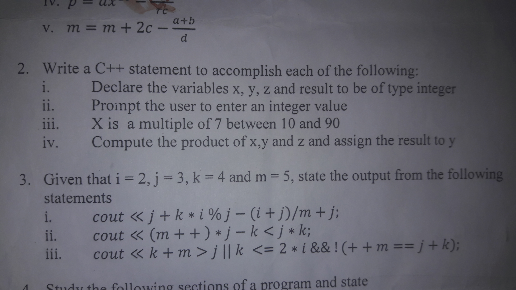
Question and Answers Forum
OthersQuestion and Answers: Page 71


|
Question and Answers Forum |
OthersQuestion and Answers: Page 71 |

|
| ∫x^3 sin(2x^2 +6)^5 dx |
| ⌊2x−(1/2)⌋=⌊∣x∣−(1/2)⌋=2x−2 |
| lim_(x→∞) ((tanx)/x) |
| ∫((√(x^2 −25))/x)dx |
| A primitive of the function defned by f(x) = x −1 + (1/(x+1)) is A. F(x) = (x^2 /2) −x + ln(x + 1) B. F(x) = (x^2 /2) + ln(x−1) C. F(x) = (x^2 /2)−x + ln(1−x) D. F(x) = −x + ln(x−1) |
| i−∫_0 ^5 (x+[2x])^([(x/3)]) dx ii−∫_0 ^3 (z−{z})^([z]) dz |
| ∫cos^(2020) x dx = ? |
| Is a matrix A^T A always positive definite? |
| please any recommendation of a youtube video on General conics?? |
| ∫ _0 ^∞ (dx/((x+(√(1+x^2 )))^2 )) let x = tan t ⇒dx=sec^2 t dt ∫_0 ^(π/2) ((sec^2 t dt)/((tan t+sec t)^2 )) = ∫_0 ^(π/2) (dt/((sin t+1)^2 )) = ∫_0 ^(π/2) (dt/((cos (1/2)t+sin (1/2)t)^4 )) = ∫_0 ^(π/2) (dt/(4cos^4 ((1/2)t−(π/4)))) = (1/4)∫_0 ^(π/2) sec^4 ((1/2)t−(π/4)) dt [ let (1/2)t−(π/4)= u] = (1/4)∫_(−(π/4)) ^0 sec^4 u ×2du =(1/2)∫ _(−(π/4)) ^0 (tan^2 u+1) d(tan u) = (1/2) [(1/3)tan^3 u + tan u ]_(−(π/4)) ^0 = (1/2) [ 0−(−(1/3)−1)]= (2/3) |
| Solve: (D^2 +2D+1)y= x cos x |
| ∫x(sin(cos(x)))^(x−1) dx |

|
| who can help write out the mechanism for the reaction C_6 H_6 →_(HNO_3 ) ^(H_2 SO_4 ) C_6 H_5 NO_2 |
| find the centre of symmetry of the curve y = (1/(x + 2)) |
| In C++ What is the sections doing ? and What is the output from the sections below ? a. int p=o; for (int i=1; i<=30; i++){ if (i%5==0) p+=i; } cout<<p<<endl; b. int count=2; int g=0; while (count<=50){ g=count; cout<<g<<endl; count +=2; } cout<<count<<endl; |
| show that ∫_0 ^n [x^2 ]dx =n(n^2 −1)−Σ_(k=1) ^(n^2 −1) (√k) |
| what procedure will you use to find the inverse of A = ((2,1,9),(1,5,1),(3,0,3) ) |
| lim_(x→e) [∫_0 ^e ((1/x))dx] =? |
| evaluate: lim_(x→0) (√x) ln(sin x) |
| a^3 −b^3 =...? |
| solve integration ∫_1 ^2 x d⌊x^2 ⌋ |
| x≤[x]<x+1 is that right if (x) was negative |
| log_(x/2) x^2 −log_(16x) x^3 +40log_(4x) (√x)=0 |
| If we have : y = e^x What is : (d/dy)e^x = ... If we derivate with y... Please... |